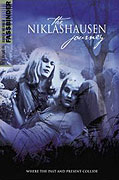Cinematography:
Dietrich LohmannComposer:
Peer RabenCast:
Hanna Schygulla, Rainer Werner Fassbinder, Peter Berling, Ingrid Caven, Margit Carstensen, Günther Kaufmann, Kurt Raab, Magdalena Montezuma, Peer Raben (more)Plots(1)
Unseen between its first television broadcast in 1970 and its rediscovery in 2002, The Niklashausen Journey chronicles the journey of a young peasant in the 15th century and his quest to overcome social injustice, in Fassbinder’s allegorical critique of the student movement. (Arrow Films)
Reviews (1)
History revolves in a circle, only the scenery and slogans truly change, faith in salvation takes on both divine and earthly forms, but does the foundation remain the same? The search for an answer is undertaken not only by the audience but also by the authors themselves - in this alienating effect, in which Fassbinder, as a trans/historical figure, travels through both epochs, we can literally observe his (and the entire film's) relationship to revolutionary events. His inquisitive, gloomy, and reserved attitude is combined with an almost phlegmatic observation of the surrounding world, at the end of which comes an equally unexcited nod in support of the fight for a better future, while the contrast between this calm attitude and the revolutionary grandeur around the year 1968 in the West probably suggests how further subversive work towards the status quo should proceed: without unnecessary and hasty excesses, but with true personal commitment. /// Cinematically, this film still bears the significant influence of Godard in that a large part of the film resembles a harvest of Godard's Maoist films such as Weekend or East Wind. On the other hand, the theme of peasant revolt as a precursor to modern emancipatory struggle was also used at the same time by Schlöndorff in Sudden Wealth of the Poor People of Kombach, and a short scene full of symbolism and declamation delivered by Montezuma echoes Schroeter's or Ottinger's films.
()
Gallery (41)
Photo © Westdeutscher Rundfunk (WDR)

